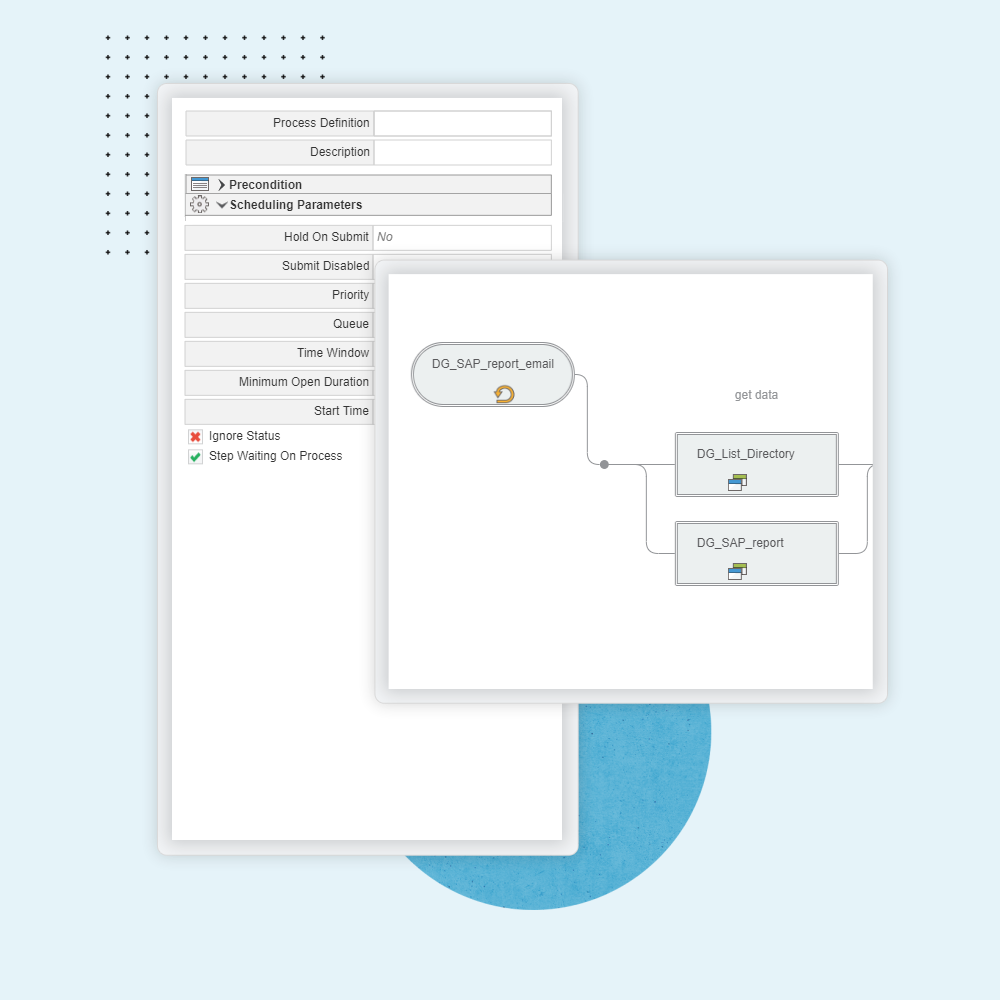The ETL automation tool designed for hybrid IT
Integrate disparate data sources and improve data quality with a modern, cloud-native ETL tool.

Simplify your cloud data warehouse operations
Optimize your data flows, regardless of volume and complexity, using RunMyJobs by Redwood’s advanced workload automation functionality and intuitive user interface.
-
Low-code data integration
Eliminate time-consuming manual coding and simplify workflow creation with drag-and-drop components pre-configured for ETL tasks. -
Accelerated digital transformation
Keep up with modern data volumes and increasing data complexity while you continue on the path to modernization. -
Cloud-native data management
Leverage cloud-based data storage and processing resources to support scalability and handle all types of datasets. -
Data security made simple
Rest easy knowing you’re protected by best-in-class security policies, fully encrypted communications and certified adherence to strict compliance standards.

Integrate data across your ecosystem
Seamlessly coordinate and integrate on-premises data flows, OS activity, API adapters and cloud service providers (AWS, Azure, VMware, Google Cloud). Automate repetitive tasks with RunMyJobs’ no-code connectors, sequences, calendars and more.
- Execute workflows in real-time based on detected source files, data, events, messages from apps and more.
- Ensure data timeliness and availability with powerful exception handling, auto-remediation and access control.
- Build custom workflows and consumable automation. services/microservices with native SOA APIs and formats.
- Centralize control over cloud computing, resource provisioning and data across ERP, CRM, finance, ETL and more.

Orchestrate data flows as you scale
Add as many servers, applications and environments as you need without worrying about extra pricing or budget restrictions. RunMyJobs is designed to expand as DevOps adapts to new business requirements.
- IT operations: Automate IT processes across on-premises and multi-cloud environments, OS activity and web API interactions.
- Managed file transfers: Move, copy and manage millions of files per month across Amazon S3, Azure Storage, Google Cloud Storage and more.
- Data warehousing: Coordinate resource management applications in hybrid environments, automate virtualization and run common ETL testing and database tasks.
- Business processes: Orchestrate data workflows, real-time dashboards, big data (Hadoop), business intelligence (BI tools) and more with an intuitive, drag-and-drop interface.

Stay flexible with cloud connectivity
Redwood offers the only workload management software built for SaaS scalability and hybrid cloud environments. Eliminate the hassle of hosting, deploying and maintaining your multi-cloud management solution.
- Single-tenant cloud architecture with zero-effort maintenance and guaranteed 99.95% uptime
- Flexible load balancing and priority processing across applications to extract data without bottlenecks and downtime
- Virtual server configurations and scripts with lightweight, self-updating agents for Windows, Linux, AIX, HPUX, macOS, OpenVMS and Solaris
- Real-time metric overviews and dashboards with alerts and SLA notifications to enable teams to resolve issues before they impact performance

Protect your organization, employees and customers
- Access SAP, Oracle, AS/400, VMS and other applications and web services directly through TLS 1.3-encrypted, agentless connections.
- Use built-in authentication or SSO/SAML 2.0+ integration such as Okta, Ping Identity, PingFederate or Microsoft Azure AD.
- Establish a comprehensive audit trail for all process and user activity and enforce business rules across the enterprise.
- Rely on Redwood’s ISO 27001, SOC 2 and CSA STAR Level 1 certifications, best-in-class SaaS security policies and regular penetration tests.
Have confidence in your data transformations
With Redwood’s cloud-native automation and orchestration platform, your business can transform to meet the challenges of the hybrid, digital enterprise. Achieve more through automation: more efficiency, more resiliency, more flexibility, more customer loyalty and more opportunity. Let our team show you why thousands of leading organizations worldwide rely on Redwood to help them excel in the digital age.

Endless data-focused extensibility
RunMyJobs connects out of the box with a variety of data management and ETL solutions, including:
- Azure Data Factory: Create, schedule and manage data pipelines.
- Informatica Cloud: Orchestrate Informatica jobs, including complex dependencies.
- Snowflake: Transform your raw data into usable insights for better decision-making.
Frequently Asked Questions
What is ETL?
Extract, transform, load (ETL)is a part of the data testing process and is used to move and transform data between different data stores, such as databases, data warehouses and data lakes.
In an ETL process, data is first extracted from various sources, such as operational databases, flat files or APIs.
The extracted data is then transformed into a format that is suitable for the target data store, such as by filtering, aggregating or joining the data.
Finally, the transformed data is loaded into the target data store, such as a data warehouse or data lake, where it can be used for analytical or reporting purposes.
Data validation is an important step within the transform phase of ETL, where the data is checked to ensure that it conforms to specific rules or the quality of the transformed data.
ETL is heavily dependent on the quality and integrity of the source data and requires careful handling and preparation to ensure the success of the transformation and loading processes. Learn more about Redwood’s data automation software and testing solution.
What is ETL automation?
ETL automation refers to the methods and tools used to extract, transform and load data without human intervention. ETL automation has grown in importance as data processes have become more complex and businesses are more dependent on disparate data sets.
Cloud-native workload automation solutions such as RunMyJobs by Redwood offer low-code ETL automation and data orchestration. Automate your entire data pipeline with Redwood.
What are enterprise ETL tools?
ETL tools are specialized software solutions designed to handle the complex data processing needs of large organizations. These tools extract data from various sources, transform it to meet specific business or technical requirements and load it into a target system. ETL tools are essential for data integration because they ensure data from disparate systems is clean, consistent and ready for data analytics.
In large enterprises, ETL use cases include handling high volumes of data from multiple, diverse sources, including relational databases, CRMs, ERPs, financial applications and more. Enterprise ETL tools typically offer features like automation, error handling and data validation. They also handle metadata management, which is critical for tracking information about data, such as its source, transformations and loading history.
These solutions often come with pre-built connectors for popular enterprise applications (like Salesforce, SAP or Oracle) and can manage complex data workflows. Some advanced ETL tools also support real-time data processing and can be part of larger data pipeline automation strategies, helping businesses drive actionable insights faster. Well-known ETL tools include Informatica, Talend, Apache NiFi and Microsoft SQL Server Integration Services (SSIS).
ETL testing tools also play a critical role in allowing testers and administrators to verify the integrity of a data pipeline and, therefore, data accuracy. These tools verify that data is correctly extracted, transformed and loaded without loss or corruption. ETL testing tools can automate testing processes, validate data transformations, ensure data consistency across different systems and flag any discrepancies or errors. This is particularly important when engaging in regression testing or working with relational databases, as the complexity of schema changes and data relationships must be rigorously tested.
What is the difference between ERP and ETL?
Enterprise resource planning (ERP) and extract, transform, load (ETL) serve different functions within an organization’s IT ecosystem, though they often interact.
ERP is a type of business management software that integrates various business functions, such as finance, human resources, supply chain, manufacturing and procurement, into a unified system. It helps organizations manage their day-to-day operations by providing a centralized platform for data entry, storage and analysis. Examples of ERP systems include SAP, Oracle ERP and Microsoft Dynamics. The goal of an ERP system is to streamline operations, improve efficiency and provide real-time visibility into key business processes.
ETL is a process and set of tools used for data integration. It moves data from multiple source systems and consolidates it for further analysis, often in a data warehouse or cloud storage solution. The ETL process extracts data from databases, applications or flat files, transforms it into a usable format by cleaning and validating it and then loads it into a target system for reporting or analytics. ETL is critical for maintaining clean, consistent and accurate data across an enterprise.